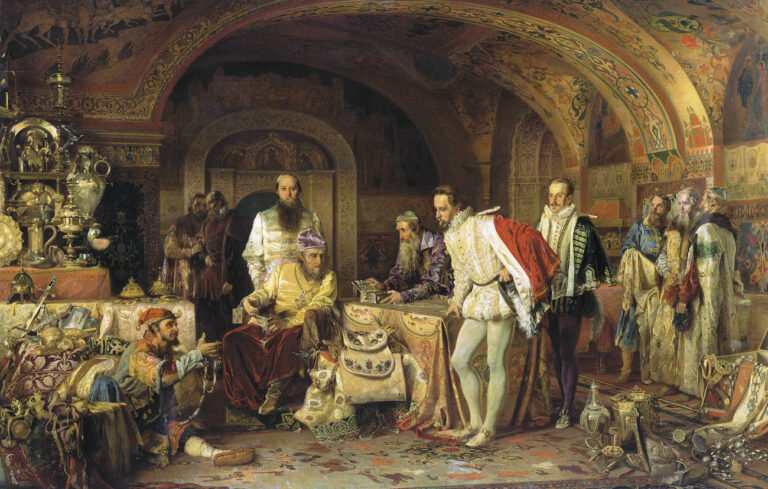
Moscow is 2,500km from Brussels and 7,500km from Beijing. Although Russia’s vast terrains stretch into the far East, its political and cultural centre has been, and always will be in Europe. That Russia is now an ally of China, its historic foe, and an enemy of Europe is, to put it mildly, an anomaly.
Russia bid to become recognised as a European nation started in the late 16th Century; arguably it is a 450-year quest which has yet to be resolved. Modern European Russia started with Ivan the Terrible (Formidable) who, in 1547, was crowned Tsar of all of Russia in the Kremlin’s Orthodox Cathedral of the Dormition. To get access to the Baltic, in 1558 Ivan took on the Teutonic knights of Livonia (present day Estonia and Latvia) but was pinned back during his reign by Sweden, Poland and Lithuania.
Ivan’s trading access to Europe became largely limited to England. Queen Elizabeth I established a close pen-friend relationship with Ivan after the London based Muscovy Company established a trading route via the White Sea to Archangel. Even after Ivan’s successor Peter I crushed Charles XII’s Swedish Army at the Battle of Poltava in what is now central Ukraine, Russia failed to establish a major European port. By contrast with its encroachment on Europe, Russia’s expansion eastwards was largely sub-contracted to the Stroganoff trading family.
Peter the Great finally established Russia as a European trading and naval power in 1703 with the founding of his magnificent new city on the Baltic. St.Petersburg, unlike Archangel on the White Sea, was not icebound in winter. Russia’s new capital brought the latest technology and ideas from Europe.
Later, Catherine the Great capped this breakthrough to the West. A scion of the powerful German Anhalt family Catherine was also a descendent of Ivan the Terrible’s Rurik dynasty. Educated by French tutors, she conducted a 15-year friendship by correspondence with Voltaire, the philosopher and high priest of the European Enlightenment. Her intellectual appetites even exceeded her prodigious sexual ones. Western European culture poured into Russia.
Like Peter the Great, she a founded a great naval and trading city, Odessa, this time on the Black Sea, which gave Russia maritime access to southern Europe. Thereafter Russia competed as a great European power and Tsar Alexander I was, along with Metternich, Talleyrand and British foreign minister, Castlereagh, one of the key power brokers at the Congress of Vienna [1815]. After the fall of Napoleon, it established a balance of powers in Europe which lasted for almost a century.
Sent in purdah by Europe after the Russian revolution, Russia fully expected to be welcomed back into the European fold after the dissolution of the Soviet Union. President Putin told the legendary political journalist Sir David Frost that ‘Russia is part of the European culture’. That Putin needed to say this betrays the deep yearning by Russian leaders, from Ivan the Terrible onwards, to be accepted as part of Europe. Indeed George Robertson, the Scotsman who led NATO between 1999 and 2003, recorded that in their first meeting that Putin asked to join and be ‘part of that secure, stable prosperous west.’ The spurning of Russia’s desire to be considered European probably fed Putin’s paranoia about Western motives. History may note this as perhaps the greatest geopolitical missed opportunity of the 21st Century.
Perversely Russia is still seen by some to be outside Europe. A survey of Russia’s cultural output makes a mockery of this view. The works of Dostoevsky, Tolstoy, and Pushkin are central to the canon of European literature. Arguably as a European playwright Anton Chekhov is second only Shakespeare.
Russian composers such as Tchaikovsky, Mussorgsky, Prokofiev, Rachmaninoff and Shostakovich are mainstays of European classical music. Historically Russia has provided Europe with a large portion of its finest musicians including pianists such as Rubinstein, Richter, Horovitz, Kissin and Sokolov. The greatest cellist of the 20th Century, Piatigorsky and the violinist Menuhin were trained at the legendary Russian music schools in Odessa.
Great 19th Century Russian painters such as Repin and Bogolyubov lie within the classical traditions of European art while artists such as Chagall, Kandinsky, Malevich, Gabo and Rodchenko were leaders of the avant-garde in Europe. Russian Constructivism was one of the most influential European art movements of the 20th Century.
Underlying Russia’s European heritage is a shared Christian philosophical and cultural tradition. The schism in Europe that seemed to have disappeared after the collapse of the Soviet Union has now re-emerged since last week’s invasion of the Ukraine into a Cold War 2.0. In the West a new Russiaphobia is emerging. This outcome is a cultural as well as a geopolitical catastrophe.
Sie müssen sich anmelden, um einen Kommentar abzugeben.
Noch kein Kommentar-Konto? Hier kostenlos registrieren.
De Gaulle‘s vision „Europe from the Atlantic to the Ural“ could put Europe back on the map. These days, Europe is barely recognized, no, belittled or even ridiculed by the rest of the world while its governments are anesthetized by this huge gender, woke and do-goodism cloud. After this Putin nightmare, it probably would make sense to look more East to find a bit more reality. We certainly wouldn’t find it across the Atlantic from our traditional role model.
There is, however, something that is lacking in the Russian culture to make them truly European and that cannot be obscured by the fact that Catherine the Great was such an admirer of European Enlightenment which is the advocation of democracy. Not the tsars or the Bolshevik nor the post-soviet leader Vladimir Putin have a true devotion to give the people the right to elect their own government. And that was what enlightenment was really about. The central European cultural foundation.